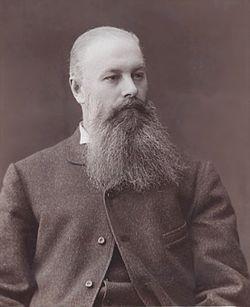Dokuchaev
| Vasily V. Dokuchaev | |
|---|---|

V. Dokuchaev (Saint Petersburg, 1888)
|
|
| Born |
1 March 1846 Smolensk Governorate, Russian Empire |
| Died | 8 November 1903 (aged 57) Saint Petersburg, Russian Empire |
| Nationality | Russia |
| Fields | Geography, Geology, Soil science |
| Institutions | Saint Petersburg University |
| Known for | Modern Soil science founder |
| Influenced | Vladimir Vernadsky |
Vasily Vasili'evich Dokuchaev (Russian: Васи́лий Васи́льевич Докуча́ев) (March 1, 1846 in Milyukovo, Smolensk Governorate – November 8, 1903 in Saint Petersburg) was a Russian Geologist and Geographer who is credited with laying the foundations of soil science.
Vasily Vasil'evich Dokuchaev is commonly regarded as the father of Soil science, the study of soils in its natural setting. He developed soil science in Russia, and was, perhaps the first person to make wide geographical investigations of different soil types. His great contribution to science was, figuratively, to "put soils on the map".
He introduced the idea that geographical variations in soil type could be explained in relation not only to geological factors (parent material), but also to climatic and topographic factors, and the time available for pedogenesis (soil formation) to operate. Using these ideas as a basis, he created the first soil classification. His ideas were quickly taken up by a number of soil scientists, including Hans Jenny.
He worked on soil science, and developed a classification scheme describing five factors for soil formation. He arrived at his theory after extensive field studies on Russian soils in 1883. His most famous work is Russian Chernozem (1883). Thanks to Dokuchaev's works a number of Russian soil terms are in the international soil science vocabulary (chernozem, podsol, gley, solonets). A crater on Mars is named in his honor and the Dokuchaev Award, the equivalent of the Nobel Prize in the field of Soil Science, was instituted by the International Union of Soil Sciences.
...
Wikipedia
